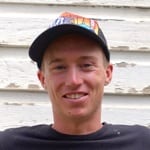There’s always someone up earlier than you.
I’m standing at the window of a hotel room that’s nine floors above the ground in downtown Philadelphia. 6:00 a.m. and there are already little people scurrying about their business down below, buses rumbling from block to block carrying these early birds from where they started to where they’re going. A gorgeous pre-dawn blue illuminates the morning sky above the tall stone buildings, themselves lit by the dim inner lights of offices with no workers, yet. That sky is the same sky seen at the same time in the wild places, in the mountains and river valleys where there are more sounds than air conditioning and diesel engines, where birds call and water flows and leaves rustle. Where that sky is the only light at all. There’s always someone up earlier than you in the woods, too.
But you keep moving anyway.
Toward the lights and away from them; over steep hills and across wide plains; from one mountain range to another. The high places are the wild places, the oases thrust above the shattering rattle of the busy places. They have come to mean more than the peaks themselves; these mountains signify the very embodiment of quiet and a kind of reality that used to exist everywhere but now remains only in isolated corners. The light searches for those corners ceaselessly, and you who know of them fear terribly their exposure, which surely must mean their ruin. The light is stronger than your secrets, you know this. There’s nothing you can do.
Except to keep moving.
Philadelphia is an interesting place. They tell me that the Declaration of Independence was signed in one of these buildings, and there’s a famous bell here that was rung at a significant moment in history, and then apparently dropped at a less significant moment. The city blocks are squares, and each corner requires a stop, so instead I run on the treadmill and try not to look at the televisions showing me people who want me to think that these moments are historic, too. But these are just moments. By the time I’m done I’ve run eight miles without going anywhere at all. Yet in the last four days I have driven over 2,000 miles, from the place I live to the end of the continent here in Pennsylvania. This city was one of our country’s first, and it’s the last city I’ll see in America for a long time. Tomorrow I get on a boat going east. I gotta’ keep moving, always moving.
I run mainly to keep moving. I run to compete, too, of course, but that’s secondary. That’s just fun. The running itself goes deeper, to places far away inside of me that have no light, yet. The Chris McDougalls tell me that it is primordial and instinctive; the Anton Krupickas tell me that it is intentional and beautiful; my uncle Jack tells me that it’s bad for my knees. They’re all correct, too. I love to run sometimes, and other times I run to love, and even other times I hate to run, or I hate why I run, or I hate what I’m running for. Our sport has a culture that is in many ways opposed to the train-to-win mindset seen in road running or other sports like triathlon or cycling. Nobody is intense; everybody is out to simply enjoy the experience. This attitude gives me an excuse when I’m training to resent running. But when the movement stops, everything stops. I’m nobody in one place.
I really hope that we preserve that culture. Competition should be secondary to the joy of movement. As the perfect symbol of a life well lived, running is movement, in some form or another. And as we keep running, we’re eventually going to run out of corners in the high places to explore. We’ll get curious about what lies beyond the mountains, and then we’ll go down into the in-between places, to the plains and forests and deserts that stretch uninterruptedly into that gorgeous morning light that makes the world look as if it’s in the middle of taking a deep breath. And there we’ll find other people already out scurrying around on the trails. They’re shining their lights into their own secret corners and hoping nobody will find out. But the secret is too good not to share, and soon we’ll be showing them the dark places we know of, too.
But they’ve already seen them.
Call for Comments (from Meghan)
- What elements of trail running do you hope stand the test of time?
- What makes you run? Do you always love it when you’re doing it? What happens to you on the days you don’t love running? Do you run anyway?
- Is running a form of movement for your brain, body, or both?
